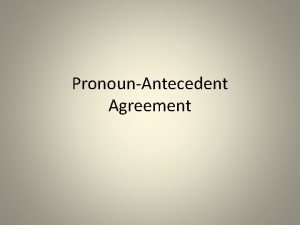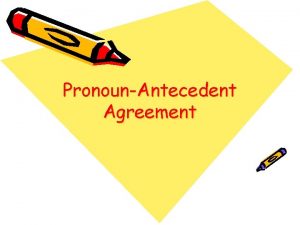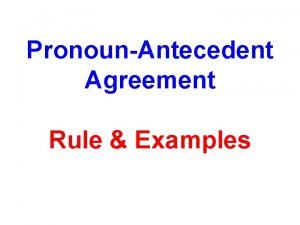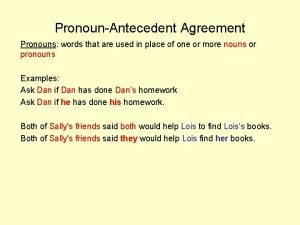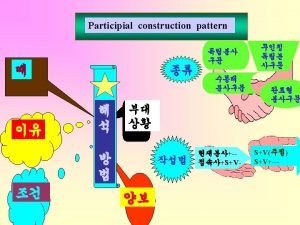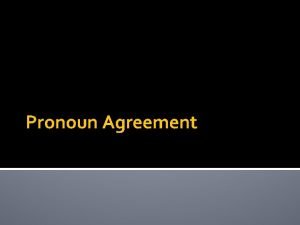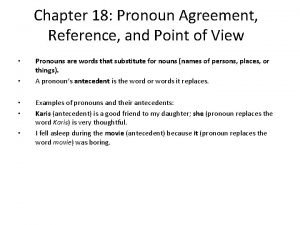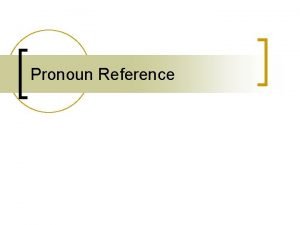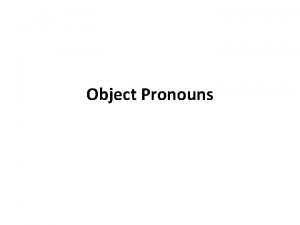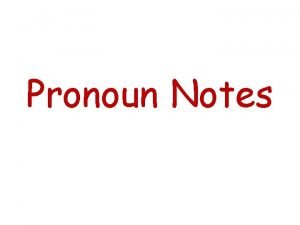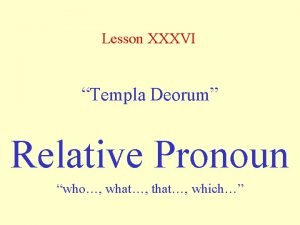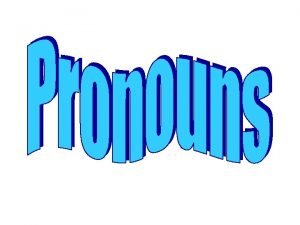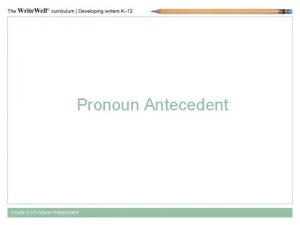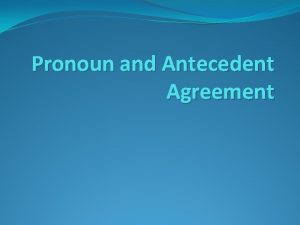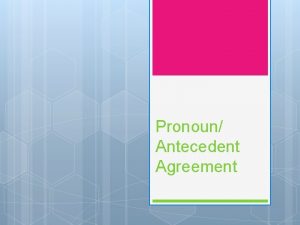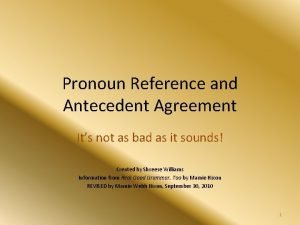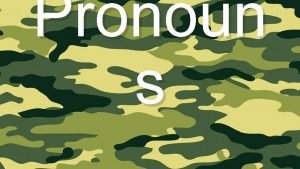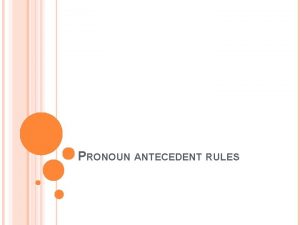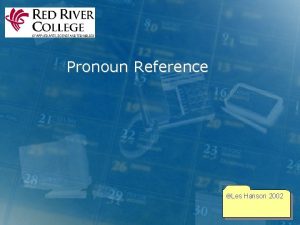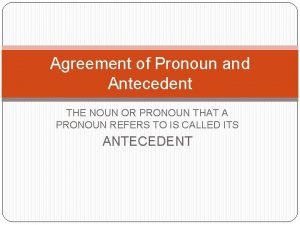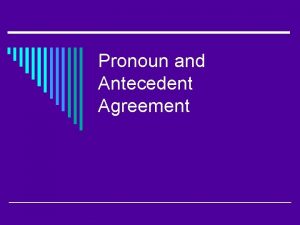Pronoun Reference and Antecedent Agreement Adapted from Real

















- Slides: 17

Pronoun Reference and Antecedent Agreement Adapted from Real Good Grammar, Too by Mamie Webb Hixon

Definitions A pronoun is a word that takes the place of a noun: noun Herbie is Ellie’s hamster. pronoun He is her hamster. An antecedent is the word the pronoun refers to or takes the place of: antecedent 1 pronoun 1 antecedent 2 Little Bo Peep has lost her sheep and can’t tell pronoun 2 where to find them.

It's All about Agreement Pronouns must agree with their antecedents in two ways: gender and number. Andrew has lost his wallet. Andrew is male, and the masculine pronoun his replaces his name. All the tools are in their proper places. There are multiple tools, and the plural pronoun their replaces the tools.

Oops! Ambiguous Antecedent This type of error occurs when a given pronoun could refer to one of many possible antecedents. The partnership between Justin and Paul dissolved when he retired. Who retired is unclear. Replace “he” with the word to which “he” was meant to refer. The partnership between Justin and Paul dissolved when Justin retired.

Oops! Remote Antecedent This type of error occurs when an antecedent is too far away from its pronoun, making the relationship between the two unclear. The ultramodern condominiums are located in an area of town where there are no streetlights. However, they are perfectly safe. Who or what is perfectly safe? “They” is too far away from its referent to be clear. Replace “they” with the word or phrase to which it was meant to refer. The ultramodern condominiums are located in an area of town where there are no streetlights. However, these condominiums are perfectly safe.

Oops! Implied Antecedent This type of error occurs when the antecedent is implied rather than stated. Randi thinks flying is the best way to travel though she has never been on one. What Randi has never been on is unclear. Replace “one” with the word or phrase to which it was meant to refer. Randi thinks flying is the best way to travel though she has never been on an airplane.

Oops! Broad Antecedent This type of error results from the use of “which, ” “it, ” “this, ” or “that” to refer to an entire sentence or idea. The cost of living increased another two percent, which caused a serious problem for people who earn low wages. “Which” should refer to a single word, not an entire idea. Insert a specific word or phrase before “which. ” The cost of living increased another two percent, a situation which caused a serious problem for people who earn low wages.

Oops! Indefinite Antecedent This type of error occurs when a pronoun refers to an unseen or unknown group or entity. When I read the actor’s autobiography, it made me realize what hard work acting is. “It” refers to an unknown entity. Replace “it” with the word or phrase to which it was meant to refer. When I read the actor’s autobiography, her story made me realize what hard work acting is.

Oops! Unexpressed Antecedent This type of error occurs when a pronoun refers to a noun that is not present. The library is a great place to work, but they have to stand up often. “They” does not have an antecedent. Replace “they” with the word or phrase to which it was meant to refer. The library is a great place to work, but the library employees have to stand up often.

Word to Watch for: It “It” Mr. Grey is skeptical about climate change. It does not surprise me. “It” does not have a clear antecedent. Reword the sentence to include a “that” clause. I am not surprised that Mr. Grey is skeptical about climate change.

Word to Watch for: This “This” Mr. Grey is skeptical about climate change. This does not surprise me. “This” does not have a clear antecedent. After “this, ” insert the word or phrase to which “this” was meant to refer. Mr. Grey is skeptical about climate change. This attitude does not surprise me.

Word to Watch for: That “That” Mr. Grey is skeptical about climate change. That does not surprise me. “That” lacks a clear antecedent. After “that, ” add a specific word or phrase. Mr. Grey is skeptical about climate change. That attitude does not surprise me. Some people take this rule to mean one must never use the word “that” in writing. However, there are important uses for “that” that don’t involve vague pronoun references. “That” as a demonstrative determiner: How much is that doggy in the window? “That” as a relative pronoun: Bre has a cough that won’t go away. “That” as a nominalizer: I know that you were eavesdropping.

Word to Watch for: Which “Which” Mr. Grey is skeptical about climate change, which does not surprise me. “Which” should refer to a specific noun, not the entire idea. Insert a specific word or phrase before “which. ” Our contractor is skeptical about solar energy, a fact which does not surprise me.

Indefinite Pronouns Indefinite pronouns ending with -body, -one, and -thing are singular: Anybody Nobody Somebody Anyone No one Someone Anything Nothing Something The following indefinite pronouns are plural: Both Many Few Others

Collective Nouns Antecedents can refer to a group as a whole or to the individuals of the group. Which pronoun one should use depends upon what the pronoun refers to. Collective Use: The jury has decided its verdict. The antecedent “jury” is singular because the members of the jury are working as a unit. Plural Use: The jury members are ordering different meals for their lunches. The antecedent “jury” is plural because the members of the jury are working individually. To improve clarity, add the word “members” after “jury. ”

Compound Antecedents Use plural pronouns when “and” joins two items in the antecedent. Since Stewart and Rosemary built a cabin in the mountains, they are blissfully happy. The antecedent “Stewart and Rosemary” is plural because it refers to more than one person. Match the antecedent with the plural pronoun “they. ”

Compound Antecedents When “either. . . or” and “neither. . . nor” join two items in the antecedent, match the pronoun with the closer antecedent. Neither the students nor Mrs. Moore found her way to the conference room. The sentence above is technically correct, but it demonstrates that this rule can produce an awkward situation in which a singular pronoun appears to refer to a plural antecedent. Avoid this problem by putting the singular noun first and the plural noun closer to the pronoun. Neither Mrs. Moore nor her students found their way to the conference room. Because the plural antecedent “her students” is closer to the pronoun than the singular pronoun “Mrs. Moore” is, match the antecedent with the plural pronoun “their. ”
 Antecedent pronoun agreement
Antecedent pronoun agreement Pronoun antecedent agreement meaning
Pronoun antecedent agreement meaning Antecedent pronoun agreement
Antecedent pronoun agreement Title of single entities examples
Title of single entities examples Pronoun antecedent
Pronoun antecedent Pronoun antecedent agreement
Pronoun antecedent agreement What is the basic principle of pronoun antecedent agreement
What is the basic principle of pronoun antecedent agreement Pronoun and antecedent
Pronoun and antecedent What is a pronoun
What is a pronoun Antecedent of pronoun meaning
Antecedent of pronoun meaning What is the basic principle of pronoun antecedent agreement
What is the basic principle of pronoun antecedent agreement Pronoun agreement and reference
Pronoun agreement and reference Personal pronoun
Personal pronoun Plural pronouns
Plural pronouns Pronouns and their antecedents must agree in
Pronouns and their antecedents must agree in Antecedent
Antecedent Underline the relative pronouns
Underline the relative pronouns Pronoun antecedent
Pronoun antecedent

